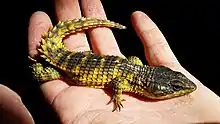| Cape girdled lizard | |
|---|---|
_(30507791826).jpg.webp) | |
| At Mountain Zebra N.P., Eastern Cape | |
| Scientific classification | |
| Domain: | Eukaryota |
| Kingdom: | Animalia |
| Phylum: | Chordata |
| Class: | Reptilia |
| Order: | Squamata |
| Family: | Cordylidae |
| Genus: | Cordylus |
| Species: | C. cordylus |
| Binomial name | |
| Cordylus cordylus | |
Cordylus cordylus, the Cape girdled lizard, is a medium-sized lizard indigenous to the southern Cape region of South Africa, where it inhabits crags, rocky outcrops and mountain summits. They evade predators by wedging themselves firmly in rock cracks.
Description

The Cape girdled lizard has a golden-brown body with spiny, keeled body scales, especially on its tail.
Range
It is indigenous to the Western and Eastern Cape provinces of South Africa, from Saldanha and Cape Town eastwards as far as Lesotho.
Food
They feed on insects, which are caught by rushing and pouncing.
Habits
They live in large colonies (with social hierarchies) on crags, rocky outcrops and mountain summits. They can often be seen sunbathing on top of prominent rocks. The lizards hide in rocky cracks, but come out in the morning and evening to forage. If threatened, they retreat to their holes and cracks in the rocks, wedge themselves in and lock their bodies there by inflating their lungs. Jammed into the cracks like this, with their thorny tail wrapped protectively over their faces, they are incredibly difficult to prise out.
Reproduction
In the autumn, the females give birth to one or two young, which stay very near the mother for the first year.
References
- ↑ Bates, M.F.; Mouton, P.L.F.N. (2018). "Cordylus cordylus". IUCN Red List of Threatened Species. 2018: e.T110159331A115674365. doi:10.2305/IUCN.UK.2018-2.RLTS.T110159331A115674365.en. Retrieved 18 November 2021.
Further reading
- Branch, B., 1998. Field Guide to Snakes and other Reptiles of Southern Africa: Ralph Curtis Books Publishing, Sanibel Island, Florida, 399 pp.
- Fitzsimons, V. F., 1943. The Lizards of South Africa: Transvaal Museum Memoir, Pretoria.
